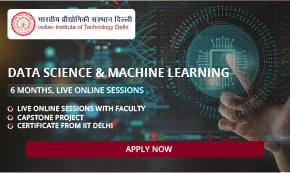What does a Data Scientist Do?

“Without big data analytics, companies are blind and deaf, wandering out onto the web like deer on a freeway.” – By Geoffrey Moore, an American
Management Consultant and Author
Data science is the discipline that deals with the realm of deploying effective scientific measures to garner intelligent data and actionable insights from a broad spectrum of structured and unstructured data. Data science has become a buzzword in the era of technology and analytics. With the onset of advanced technologies, a large amount of data generation is being observed to decode this data and derive meaningful outcomes from the given information is the job of a data scientist.
An upsurge in the market for skilled data science professionals is noted in the corporate world.
Contemporary organisations are struggling today with the systematic analysis of a vast range of outpouring data. The expertise of data scientists to transform an excessive amount of data into meaningful statistics is what these various organisations need.
A data scientist employs scads of tools in machine learning algorithms, Statistics, and domains; to assimilate the variant complexities of data. These professionals are skilled in interpreting data to provide the best actionable plan to meet the company’s calibre. Apart from managing data, data scientists are proficient in utilising their expertise to understand the trends and patterns of the corporate market. A data scientist’s task is to extract valuable information from complex data that does not fit into simple algorithms.
Along with being skilled in tech matters, a data scientist also possesses the aptitude to work closely with the business stakeholders and the company itself. Understanding the stakeholders’ goals is the prime responsibility of the data scientist in any venture. A clear understanding of business objectives and thereby framing the business problem to be solved through data science. It is equally essential for the data science professionals to be great communicators as they have too often operated within business settings and communicated complex strategies into well-planned databases. Data scientists specialise in artificial intelligence, machine learning algorithms, research, statistics and data analysis.
In broad contours, the work plan of a data scientist usually includes a four-tier process- selection of data, analysis and interpretation of data, model building and interpretation of results and explaining the impact to the client. Having the most appropriate sample of data before actually analysing the data is a prerequisite for well-planned data. By and large, the action plan of a data scientist depends on the type of data available. Being aware of the market trends allows a data scientist to pick the most appropriate information from a giant ocean of data. The most critical aspect of data science is analysing and interpreting messy and unstructured data to ply the company with valuable insights and thus present actionable results and strategies.
1. Pre-processing of data
This process works as a bridge between raw and unstructured data toward a better and more understandable data format. Hence it is a transformational phase from unstructured data into a better version. The foremost step for any data analysis is pre-processing of data. Data processing, on the whole, scrutinizes the quality of data using various indicators. These indicators can be accuracy, consistency, validity, comprehensiveness and interpretability. Data pre-processing goes through data cleaning, interpretation, reduction, and transformation.
2. Data Analysis
As soon as appropriate data is pre-processed, the obtained content is put to data analysis. Data analysis is a process that utilizes various statistical measures to develop meaningful relations among the data. Data scientists use numerous techniques and methods to find ties between data, create trends and patterns, and establish a correlation between the data set. Exploratory data analysis techniques are essential to understanding the data, and then the descriptive analysis is used to understand the historical patterns in the data.
3. Model Building
After completion of descriptive analysis, be analysis predictive and prescriptive analysis. A data scientist might use machine learning, deep learning or reinforcement learning models.
4. Interpretation of results and explanation to the business user
The business may not directly understand the results derived from the modelling. So the most crucial task for a data scientist is to make sure that results are represented in business terms so that a business user can understand the implications and take a data-driven decision.
By many accounts, a career in data science has become highly desirable in recent years. Harvard Business Review called data science the “sexiest job of the 21st century.” Working as a data scientist can be intellectually demanding, and analytically fulfilling, and will position you at the forefront of new advances in technology and your career.
~ Kapil Mahajan, Data Science Leader
——————————————–
The demand for data scientists in India is at an all-time high and transitioning from a marketing analytics job to a data science job leads to a 37% salary growth on average (India Today, 2021). Accelerate your career growth today by upskilling with a data science course from Emeritus, and learn from the leading faculty of top-ranked business schools.




